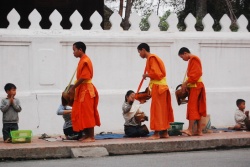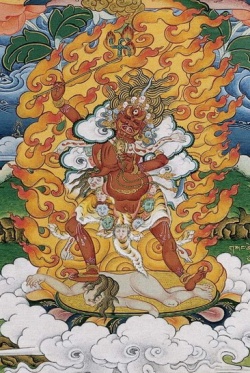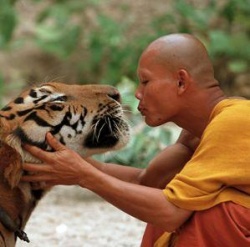Difference between revisions of "Arhathood"
| Line 1: | Line 1: | ||
{{DisplayImages|2469|1229|2510}} | {{DisplayImages|2469|1229|2510}} | ||
| + | |||
| + | |||
| + | |||
| + | |||
| + | |||
| + | |||
| + | |||
| + | |||
<poem> | <poem> | ||
"As a [[lotus]], fair and lovely, | "As a [[lotus]], fair and lovely, | ||
| Line 13: | Line 21: | ||
(1) separate [[selfhood]], | (1) separate [[selfhood]], | ||
(2) [[sceptical doubt]], | (2) [[sceptical doubt]], | ||
| − | (3) [[attachment to rules and rituals]] for their [[own]] sake, | + | (3) [[attachment to rules and rituals]] for their [[own]] [[sake]], |
(4) [[sexual desire]], | (4) [[sexual desire]], | ||
(5) [[ill will]], | (5) [[ill will]], | ||
| Line 26: | Line 34: | ||
the "[[stream-enterer]]" ("[[śrotâpanna]]") : has eradicated the first [[three fetters]]. He has only seven [[rebirths]] in the [[human]] or [[god realms]] before [[liberation]] ; | the "[[stream-enterer]]" ("[[śrotâpanna]]") : has eradicated the first [[three fetters]]. He has only seven [[rebirths]] in the [[human]] or [[god realms]] before [[liberation]] ; | ||
| − | the "[[once-returner]]" ("[[sakridâgamin]]") : [[reborn]] once more, has weakened the fourth & fifth [[fetter]] ; | + | the "[[once-returner]]" ("[[sakridâgamin]]") : [[reborn]] once more, has weakened [[the fourth]] & fifth [[fetter]] ; |
the "[[non-returner]]" ("[[anâgamin]]") : has broken all the first five [[fetters]] and is [[reborn]] in the [[god realm]] from where [[liberation]] is [[attained]] ; | the "[[non-returner]]" ("[[anâgamin]]") : has broken all the first five [[fetters]] and is [[reborn]] in the [[god realm]] from where [[liberation]] is [[attained]] ; | ||
| Line 36: | Line 44: | ||
In the [[Mahâyâna]], stressing [[Bodhicitta]], [[Arhathood]] ([[liberation]]) became a lesser goal than the one [[realized]] by the [[Bodhisattva]] : [[Buddhahood]]. The [[Lesser Vehicle]] only leads to [[liberation]], a "personal" kind of "[[nirvâna]]" characterized by the end of [[samsaric]] [[suffering]], but not to [[awakening]], the full [[enlightenment]] intended by the [[Buddha]]. This implies the [[Arhat]] has in fact not eliminated all [[obscurations]], but only those pertaining to [[afflictive emotions]] & the [[emptiness]] of [[self]]. While the foes of [[desire]], [[hatred]] and [[ignorance]] have been destroyed, achieving [[liberation]] from [[cyclic existence]], he has not {{Wiki|annihilated}} both the [[ignorance]] assenting to the false [[appearance]] of [[inherent]] [[existence]], nor the false [[appearance]] itself. Indeed, in the Lower [[Vehicle]] [[tenet]] systems, "[[own-form]]" ("sva-bhâva") is maintained. | In the [[Mahâyâna]], stressing [[Bodhicitta]], [[Arhathood]] ([[liberation]]) became a lesser goal than the one [[realized]] by the [[Bodhisattva]] : [[Buddhahood]]. The [[Lesser Vehicle]] only leads to [[liberation]], a "personal" kind of "[[nirvâna]]" characterized by the end of [[samsaric]] [[suffering]], but not to [[awakening]], the full [[enlightenment]] intended by the [[Buddha]]. This implies the [[Arhat]] has in fact not eliminated all [[obscurations]], but only those pertaining to [[afflictive emotions]] & the [[emptiness]] of [[self]]. While the foes of [[desire]], [[hatred]] and [[ignorance]] have been destroyed, achieving [[liberation]] from [[cyclic existence]], he has not {{Wiki|annihilated}} both the [[ignorance]] assenting to the false [[appearance]] of [[inherent]] [[existence]], nor the false [[appearance]] itself. Indeed, in the Lower [[Vehicle]] [[tenet]] systems, "[[own-form]]" ("sva-bhâva") is maintained. | ||
| − | Because the larger {{Wiki|perspective}}, including others and their dependent-arsing, is lacking, [[omniscience]] is not [[attained]]. [[Arhathood]] is a stage, not a station. In the [[Lesser Vehicle]], [[Buddhahood]] is identified with the complete destruction of all [[afflictive emotions]]. This is done by [[attaining]] a special [[knowledge]] of all [[phenomena]]. In this [[view]], a [[Buddha]] is all-knowing in the [[sense]] of being able to know anything he wishes by merely turning his [[mind]] to it, but not in the [[Greater Vehicle]] [[sense]] of [[realizing]] everything simultaneously (as the [[Âdi-Buddha]] does). For the [[Greater Vehicle]], the [[Arhat]] still has a non-afflicted type of (innate) [[ignorance]] as obstructions preventing [[omniscience]], the simultaneous [[knowledge]] of all things, directly [[realizing]] [[phenomena]] and their [[emptiness]] at the same [[time]]. | + | Because the larger {{Wiki|perspective}}, [[including]] others and their dependent-arsing, is lacking, [[omniscience]] is not [[attained]]. [[Arhathood]] is a stage, not a station. In the [[Lesser Vehicle]], [[Buddhahood]] is identified with the complete destruction of all [[afflictive emotions]]. This is done by [[attaining]] a special [[knowledge]] of all [[phenomena]]. In this [[view]], a [[Buddha]] is all-knowing in the [[sense]] of being able to know anything he wishes by merely turning his [[mind]] to it, but not in the [[Greater Vehicle]] [[sense]] of [[realizing]] everything simultaneously (as the [[Âdi-Buddha]] does). For the [[Greater Vehicle]], the [[Arhat]] still has a non-afflicted type of (innate) [[ignorance]] as obstructions preventing [[omniscience]], the simultaneous [[knowledge]] of all things, directly [[realizing]] [[phenomena]] and their [[emptiness]] at the same [[time]]. |
The [[Arhat]] achieves [[wisdom]] without the [[practice]] of the [[perfections]], but only through {{Wiki|limitless}} analysis. So he only overcomes the obstructions to [[liberation]], freedom from [[cyclic existence]]. While there is not a difference in the type of [[wisdom]] between the Lesser & [[Greater Vehicles]], there is a difference in the mode of [[cultivation]] and so in the eventual effect. By engaging in the practices of the [[Great Perfection]] [[Vehicle]], the [[Mahâyâna]] [[Bodhisattva]] approaches [[Buddhahood]]. To achieve it, he has to [[perfect wisdom]] by eliminating innate [[self-grasping]]. The Foe Destroyers cannot approach [[Buddhahood]], but only realize freedom from the [[suffering]] of "[[samsâra]]". They no longer [[suffer]], but lack the capacity to aid others. | The [[Arhat]] achieves [[wisdom]] without the [[practice]] of the [[perfections]], but only through {{Wiki|limitless}} analysis. So he only overcomes the obstructions to [[liberation]], freedom from [[cyclic existence]]. While there is not a difference in the type of [[wisdom]] between the Lesser & [[Greater Vehicles]], there is a difference in the mode of [[cultivation]] and so in the eventual effect. By engaging in the practices of the [[Great Perfection]] [[Vehicle]], the [[Mahâyâna]] [[Bodhisattva]] approaches [[Buddhahood]]. To achieve it, he has to [[perfect wisdom]] by eliminating innate [[self-grasping]]. The Foe Destroyers cannot approach [[Buddhahood]], but only realize freedom from the [[suffering]] of "[[samsâra]]". They no longer [[suffer]], but lack the capacity to aid others. | ||
Latest revision as of 12:27, 30 December 2023
"As a lotus, fair and lovely,
By the water is not soiled,
By the world am I not soiled,
Therefore, Brahmin, am I Buddha."
Ekottarâgama (Anguttara-nikâya), II.6.
The "Arhat" ("worthy one") or Foe Destroyer attained the highest level in the Lesser Vehicle, the stage of "no more learning". All defilements ("âsrava") and passions ("kleśa") have been extinguished and will not arise again. Ignorant craving and hatred are completely gone, while nearly all ignorance has been annihilated. During life, Arhathood is conditioned "nirvâna" ("sopadhiśeśa-nirvâna"), attaining full extinction immediately following this life. The main emphasis of the Arhat is to gain his own salvation. He is free of the ten fetters.
Liberation or enlightenment (in the Lower Vehicle, these two are not distinguished), involves the breaking of a succession of "fetters" ("samyojana"), ten in number :
(1) separate selfhood,
(2) sceptical doubt,
(3) attachment to rules and rituals for their own sake,
(4) sexual desire,
(5) ill will,
(6) desire for existence in the world of form,
(7) desire for existence in the formless world,
(8) conceit,
(9) restlessness,
(10) ignorance.
Four stages mark the supramundane path leading to Arhathood ("lokottaramârga") :
the "stream-enterer" ("śrotâpanna") : has eradicated the first three fetters. He has only seven rebirths in the human or god realms before liberation ;
the "once-returner" ("sakridâgamin") : reborn once more, has weakened the fourth & fifth fetter ;
the "non-returner" ("anâgamin") : has broken all the first five fetters and is reborn in the god realm from where liberation is attained ;
the Arhat or "Worthy One" : has broken all ten fetters and has won liberation in this life.
Together, these four stages define the "Ârya-Sangha", the Sangha Jewel of Early Buddhism, emphasizing the individual practitioner.
In the Mahâyâna, stressing Bodhicitta, Arhathood (liberation) became a lesser goal than the one realized by the Bodhisattva : Buddhahood. The Lesser Vehicle only leads to liberation, a "personal" kind of "nirvâna" characterized by the end of samsaric suffering, but not to awakening, the full enlightenment intended by the Buddha. This implies the Arhat has in fact not eliminated all obscurations, but only those pertaining to afflictive emotions & the emptiness of self. While the foes of desire, hatred and ignorance have been destroyed, achieving liberation from cyclic existence, he has not annihilated both the ignorance assenting to the false appearance of inherent existence, nor the false appearance itself. Indeed, in the Lower Vehicle tenet systems, "own-form" ("sva-bhâva") is maintained.
Because the larger perspective, including others and their dependent-arsing, is lacking, omniscience is not attained. Arhathood is a stage, not a station. In the Lesser Vehicle, Buddhahood is identified with the complete destruction of all afflictive emotions. This is done by attaining a special knowledge of all phenomena. In this view, a Buddha is all-knowing in the sense of being able to know anything he wishes by merely turning his mind to it, but not in the Greater Vehicle sense of realizing everything simultaneously (as the Âdi-Buddha does). For the Greater Vehicle, the Arhat still has a non-afflicted type of (innate) ignorance as obstructions preventing omniscience, the simultaneous knowledge of all things, directly realizing phenomena and their emptiness at the same time.
The Arhat achieves wisdom without the practice of the perfections, but only through limitless analysis. So he only overcomes the obstructions to liberation, freedom from cyclic existence. While there is not a difference in the type of wisdom between the Lesser & Greater Vehicles, there is a difference in the mode of cultivation and so in the eventual effect. By engaging in the practices of the Great Perfection Vehicle, the Mahâyâna Bodhisattva approaches Buddhahood. To achieve it, he has to perfect wisdom by eliminating innate self-grasping. The Foe Destroyers cannot approach Buddhahood, but only realize freedom from the suffering of "samsâra". They no longer suffer, but lack the capacity to aid others.
While the Foe Destroyer has eliminated all afflictive emotions, self-cherishing and acquired (intellectual) self-grasping and so is liberated from the sorrows of cyclic existence, he has not annihilated all innate self-grasping, making his mind still posit inherent existence. Realizing the identitylessness of persons, he has not approached the identitylessness of phenomena.
In terms of the Bodhisattva training (the Ten Stages), the Arhat has not completed the last three Bodhisattva stages, but dwells in the Sixth Stage. The difference between Arhathood and Buddhahood is defined by subtle innate cognitive obstructions. To eliminate these, in particular substantial instantiation, the Bodhisattva is backed by his Vow, as well as by Tantra and the Great Perfection. Lacking this, the Arhat cannot eliminate very subtle innate self-grasping and is therefore "stuck" in his own, little private "nirvâna" ... Arhathood too has to be overcome.


